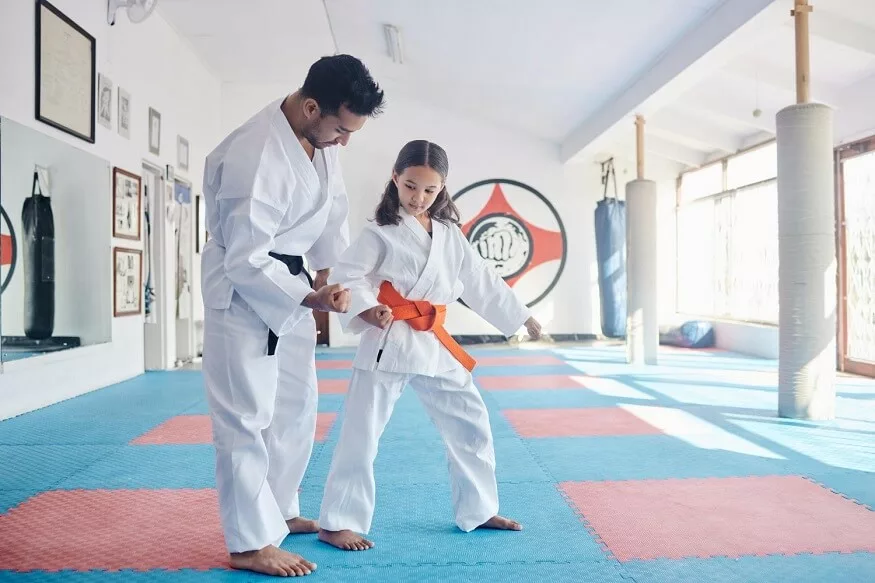The concept of teaching toddlers karate and self-defence techniques might raise eyebrows for some, as it seems counterintuitive to introduce young children to martial arts. However, when approached in the right way, toddler-friendly karate and self-defence can be beneficial for a child’s physical and emotional development.
This article by EuroSchool explores the reasons behind introducing toddlers to karate and self-defence, the benefits it offers, and some age-appropriate techniques that can help keep toddlers safe and confident.
What is self-defence?
Self-defence refers to a set of skills, techniques, or actions that individuals employ to protect themselves from physical harm or threats of violence. It includes strategies to deter, escape, or overcome potential attackers while minimising harm to oneself.
Self-defence can encompass various practices, such as martial arts, personal safety awareness, verbal de-escalation, and physical techniques, all aimed at ensuring one’s safety in potentially dangerous situations. The primary goal of self-defence is to empower individuals to respond effectively and safely when confronted with threats or violence.
Also Read: How to teach Kids to Be Smart About Strangers
Why Teach Toddlers Karate and Self-Defence?
It is very important to teach toddler karate and self-defence. Here are a few reasons why toddlers should learn karate and self-defence
Safety Awareness
- Teaching toddlers basic self-defence techniques can help them develop safety awareness. While we hope they never need to use these skills, knowing how to protect themselves in a dangerous situation can be empowering and potentially life-saving.
Physical Fitness
- Karate and self-defence training can improve a toddler’s physical fitness. It helps in developing strength, coordination, balance, and flexibility. Regular practice of martial arts can also lead to better posture and body awareness.
Discipline and Focus
- Toddlers tend to have boundless energy and limited attention spans. Karate and self-defence classes can help them channel their energy and improve their focus. Learning and mastering new techniques require discipline, which is a valuable skill for any child to develop.
Confidence Boost
- As toddlers learn and practice self-defence moves, they gain confidence in their abilities. This boost in self-esteem can have a positive impact on various aspects of their lives, including social interactions and academic performance.
Also Read: Safety tips for students to follow during school trips
Benefits of Toddler-Friendly Karate and Self-Defence Techniques
Discover the many advantages that toddler-friendly karate and self-defence techniques offer, from physical fitness to enhanced confidence and safety awareness.
Improved Motor Skills
Karate and self-defence training involve precise movements and coordination. These activities help toddlers develop fine and gross motor skills, leading to better control over their bodies.
Self-Control
Toddlers can be impulsive, and martial arts teach them self-control and the importance of patience. They learn to wait their turn, listen to instructions, and not act out of anger or frustration.
Social Skills
Karate classes provide toddlers with opportunities to interact with their peers in a structured and respectful environment. They learn how to cooperate, communicate, and show respect towards others.
Stress Relief
Even toddlers can experience stress and anxiety. Karate and self-defence techniques can serve as a healthy outlet for them to release pent-up emotions and reduce stress levels.
Goal Setting
Martial arts involve a system of earning belts or ranks, which encourages toddlers to set goals and work towards achieving them. This sense of achievement can be incredibly motivating.
Self-Confidence
The more toddlers practice karate and self-defence techniques, the more they believe in their abilities. This newfound self-confidence can positively impact their self-esteem and self-worth.
Also Read: Children’s Head Injuries SIX Warning Signs To Keep An Eye On
Toddler-Friendly Karate and Self-Defence Techniques
It’s crucial to remember that teaching karate and self-defence to toddlers should be approached with care and adapted to their age and physical capabilities. Here are some toddler-friendly techniques that focus on basic movements, awareness, and safety:
- Balance and Coordination: Begin with exercises that improve a toddler’s balance and coordination. Activities such as standing on one leg, walking along a straight line, or hopping on one foot can be fun ways to develop these skills.
- “Stop and Go”: Teach toddlers the importance of stopping and going when asked to. Practice this with simple commands like “stop” and “go” while walking or running. This helps them understand boundaries and follow instructions.
- Basic Blocking: Teach toddlers how to protect their face and body by using their arms to block imaginary strikes. Encourage them to bring their arms up to their face when they hear a signal or a word like “block.”
- “Stranger Danger” Awareness: Toddlers can learn to identify “safe” adults and “strangers.” Use age-appropriate language to explain that they should only go with people they know and trust, like family members or teachers.
- Simple Escape Techniques: Teach toddlers basic escape techniques for situations where someone grabs them. Show them how to pull away and yell for help.
- “No” and “Go”: Teach toddlers to say “no” loudly and clearly if someone makes them uncomfortable. Simultaneously, teach them that it’s okay to run away (the “go” part) from any situation that feels unsafe.
- Practice Shouting: Encourage toddlers to practice shouting “help” or “fire” to get attention if they feel threatened or need assistance. This can be done during playtime as a fun and educational activity.
- Falling Safely: Toddlers are prone to falling, so teaching them how to fall safely can be invaluable. Show them how to tuck their chin to their chest and roll onto their side if they lose balance. Make it a playful game to practice.
- Reinforce “Trusted Adult”: Remind toddlers that they can always turn to a trusted adult (e.g., parents, teachers, caregivers) if they ever feel scared or unsure. Encourage open communication about feelings and experiences.
- Role-Playing: Engage in role-playing scenarios with toddlers to reinforce safety and self-defence techniques. Pretend to be a “stranger” and see how they react.
Also Read: The Importance of Knowing One’s Address and Emergency Contact Numbers
By introducing basic movements, awareness, and safety concepts in an age-appropriate and playful manner, toddlers can develop essential life skills that will serve them well as they grow. Ultimately, the goal is not to raise a generation of mini martial artists but to equip children with the knowledge and confidence to keep themselves safe in an unpredictable world.
EuroSchool prioritises student safety through strict security measures while fostering holistic development through a well-rounded curriculum and extracurricular activities.










